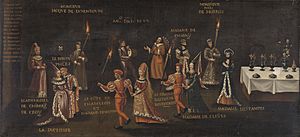Feast of the Pheasant facts for kids
The Feast of the Pheasant (also known as the Banquet of the Oath of the Pheasant in French) was a huge party. It was held by Philip the Good, who was the Duke of Burgundy. This grand event took place on February 17, 1454, in a city called Lille, which is now part of France.
The main reason for this fancy feast was to encourage a crusade. A crusade was like a big military campaign, often to reclaim lands or defend against enemies. In this case, it was meant to fight against the Ottoman Turks. The Turks had recently captured a very important city called Constantinople the year before. However, even with all the effort, this crusade never actually happened.
Contents
A Grand Party with Amazing Entertainment
We know a lot about this feast because people who were there wrote about it. Two important accounts are the Memoirs by Olivier de la Marche and the Chroniques by Mathieu d'Escouchy. These writings describe in great detail all the amazing shows and performances that happened during the meal. They even mention the different songs and music that were played.
One famous piece of music might have been a special song called a motet, written by Guillaume Dufay. It was called Lamentatio sanctae matris ecclesiae Constantinopolitanae.
Surprising Performances
Imagine this: at one point during the party, an actor dressed up in white satin clothes. This actor was pretending to be the Church of Constantinople. This church was like the main Christian church in the city that the Turks had just taken over. Some people think Olivier de la Marche himself played this part!
The actor rode into the hall on an elephant, led by a giant "Saracen" (a term used back then for a Muslim person). The actor then began to speak in a sad, soft voice. They were complaining and asking for help from the Knights of the Golden Fleece. These knights were a very important and powerful group.
Many people believe that this was the exact moment when Dufay's special song was performed. Others think the song was written later, inspired by this dramatic scene.
We also know that music by another composer named Gilles Binchois was played. There were even 24 musicians who played music from inside a giant pie! Another funny trick involved a horse riding backwards.
The Famous Oath of the Pheasant
The most important part of the feast was when everyone took an oath. This was called the Vœux du faisan, which means "oath of the pheasant". This tradition of "bird oaths" was popular in Late Medieval France. It was made famous by a story from the 14th century called the Voeux du paon (The Vows of the Peacock).
See also
 In Spanish: Banquete del Faisán para niños
In Spanish: Banquete del Faisán para niños
 | Ernest Everett Just |
 | Mary Jackson |
 | Emmett Chappelle |
 | Marie Maynard Daly |


